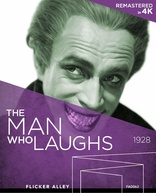The Man Who Laughs Blu-ray Movie
HomeThe Man Who Laughs Blu-ray Movie 
Flicker Alley | 1928 | 110 min | Not rated | Jun 04, 2019Movie rating
7.7 | / 10 |
Blu-ray rating
| Users | 0.0 | |
| Reviewer | 4.5 | |
| Overall | 4.5 |
Overview
The Man Who Laughs (1928)
In 1690, Lord Clancharlie returns from his exile to see his young son. The peer is captured by the King James II and before being killed, he is informed that his beloved son had been sold to the gypsies Comanchicos that carved a permanent grin on his face; they abandon the boy in the snowing winter, and while looking for shelter, he finds a baby hold in the arms of her dead mother. He brings the baby with him and they are welcomed by Ursus. Years later, Gwynplaine becomes a successful clown, and together with the blind Dea, they present plays for common people. Gwynplaine and Dea are in love for each other, but he refuses to marry her because of his ridiculous appearance. When the evil jester Barkilphedro discloses the origin of Gwynplaine, he plots a means to be rewarded by the Queen, jeopardizing the love of Gwynplaine and Dea...
Starring: Conrad Veidt, Mary Philbin, Olga Baclanova, Brandon Hurst, Cesare GravinaDirector: Paul Leni
| Horror | Uncertain |
| Drama | Uncertain |
| Romance | Uncertain |
| Mystery | Uncertain |
| Thriller | Uncertain |
Specifications
Video
Video codec: MPEG-4 AVC
Video resolution: 1080p
Aspect ratio: 1.21:1
Original aspect ratio: 1.2:1
Audio
Music: DTS-HD Master Audio 2.0 (48kHz, 24-bit)
Subtitles
English
Discs
Blu-ray Disc
Two-disc set (1 BD, 1 DVD)
Playback
Region A (locked)
Review
Rating summary
| Movie | 5.0 | |
| Video | 4.5 | |
| Audio | 5.0 | |
| Extras | 3.5 | |
| Overall | 4.5 |
The Man Who Laughs Blu-ray Movie Review
A masterpiece of silent cinema adapted from the writing of the great Victor Hugo
Reviewed by Neil Lumbard June 20, 2019As one of the great silent films of the 1920's, The Man Who Laughs is a haunting exploration of the turmoil of a disfigured young child named Gwynplaine. A group of savages commonly referred to throughout the land as comprachicos have gone throughout the countryside wrecking havoc and disfiguring the faces of young children. The film has been produced by the great Carl Laemmie (Frankenstein, Dracula).
One of these victims was the innocent Gwynplaine. In becoming a disfigured child his face took on a maniacal appearance which led to him becoming the laughingstock of his town. Gwynplaine starts to become a side-show attraction to the cruel audience gleefully laughing at his never-ending smile as he appears to them as a mere form of spectacle at the circus.
The one and only soul whom Gwynplaine connects to is the blind beauty Dea (Mary Philbin). Unlike the soul-crushing cruelty which he endures by circus attendees, Dea forms a romantic connection with him which is pure of heart. As Dea cannot see his face (carved into a smile), she connects to him on a deeply personal level which is not about physical beauty but about the radiance of Gwynplaine's heart.
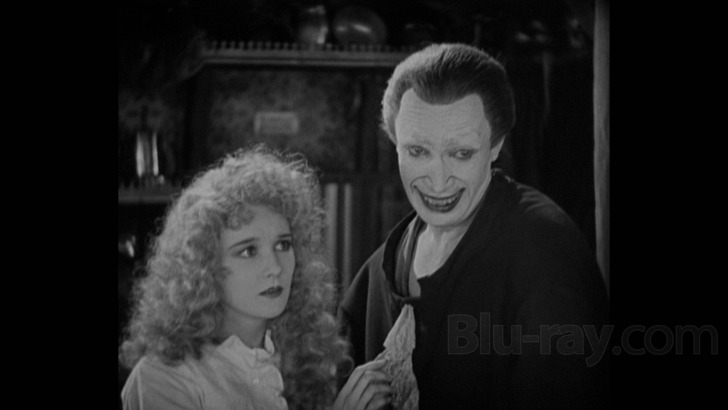
A brilliant new restoration of a silent classic
The film has a new score performed by the Berklee School of Music. Featuring compositions done by a variety of students of this famed school, this was a huge project developed for the restoration initiative. This is one of the best efforts I have ever heard for a newly recorded score for a silent film. I don't use those words lightly. The musicians involved delivered a fantastic experience. The score even reminds one somewhat of the haunting work from composer Shirley Walker for Batman: The Animated Series (I would not be surprised at all if that iconic fan-favorite score was even an inspiration on some of the music cues). If only all classic film scores received this level of love and attention to detail.
The exquisite black and white cinematography by Gilbert Warrenton (Panic in Year Zero, Telephone Operator) is a visual stunner and helps draws audiences into the cinematic world created by the film with ease. The experience feels eerily hypnotic and a large part of this aspect is the visual cues by the cinematographer. Warrenton's efforts leave a long-lasting impression. The visuals also highlight the superb costumes by designers David Cox (It's a Great Life) and Vera West (Shadow of a Doubt).
Featuring tight editing by Edward L. Cahn (Surrender, Resurrection), The Man Who Laughs feels surprisingly punchy and energetic in the rhythm of the edit. This is no doubt one of the main reasons the film has remained a favorite of classic silent film enthusiasts. It doesn't slog through any of its takes or cuts. Rather, the editing and pace feels highly focused and compelling.
J. Grubb Alexander (Svengali, The Trail of the Octopus) delivers an excellent screenplay which is one of the film's greatest strengths. Having to live up to the original source story written by the legendary author Victor Hugo is no easy feat. The storytelling carries an authenticity in exploring both the pain felt by the chastised Gwynplaine and the beating heart of the character's emotions as he connects with Dea. An argument could be made that one of the primary reasons The Man Who Laughs has withstood the test of time so well is because of the nuanced romantic storytelling: it's absorbing and uplifts the heart.
There is an immense beauty to this silent classic which manages to grab hold of one's soul. The film was a passion project for it's director. Filmmaker Paul Leni (The Last Warning, The Cat and the Canary) had enormous ambitions for the project and its clear that there was a drive behind the filmmaking. Several sequences (such as the action-packed finale) are so ambitious in scope that one wonders how the producers even managed to pull of the scenes utilizing the technology and resources of the time.
As an adaptation of the classic novel written by the brilliant author Victor Hugo (Les Miserables), Leni had high stakes to live up to with the production. Thankfully, Leni's efforts ultimately paid off with the end result being a cinematic concoction which feels just as compelling today as it would have felt for audiences experiencing the film for the first time during the theatrical run in the 1920's.
The Man Who Laughs Blu-ray Movie, Video Quality 
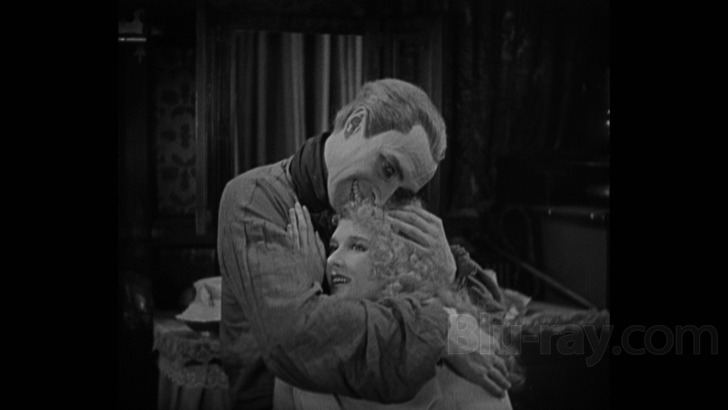
This is one of the best looking presentations I have ever seen for a classic silent film. It's hard to image that this film is almost 100 years old. Who would have thought that one day such incredible restorative work would be done for such beloved silent classics? The feature received a 4K restoration taken from the 35 mm composite source. This is a beautiful, filmic transfer with great clarity and detail. The image looks superb throughout the entire presentation. The encode quality is excellent and features a video bit-rate of 22.99 mbps. This is a strong encode which preserves the film wonderfully.
There are only a few minor blemishes on the print here and there. I was blown away by the transfer. This is a near flawless looking presentation. The transfer definitely does a commendable job of showcasing the enormously important restoration efforts from Universal Studios classic silent film restoration initiative to honor the studios incredible film legacy.
From the first frame to the very last moment of the film, The Man Who Laughs pulled me in with its fantastic imagery. Everyone involved on this remarkable new scan and restorative effort should be given a round of applause for their commendable love and care in preserving a great classic for all generations of film enthusiasts to appreciate in the years ahead.
The Man Who Laughs Blu-ray Movie, Audio Quality 
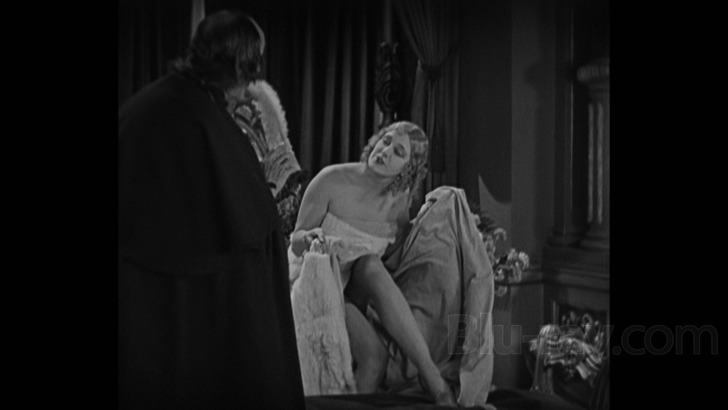
Presented with a stunning 2.0 DTS-HD Master Audio presentation beautifully reproduced in 24 bit high resolution, The Man Who Laughs has an incredible sound presentation which manages to surprise with it's excellent clarity throughout. Featuring a brand new score performed by the Berklee School of Music, the audio is every bit the excellent match in quality to the new film restoration. This is a stunning lossless audio presentation with amazing highs and crisp clarity throughout. A beautiful and haunting film score that has stayed with me each day since watching the film. In fact, the score has been stuck in my head all day long. With such detail and crisp highs on the audio track, The Man Who Laughs is a film which is greatly enhanced by the accompanying score. The film's presentation is an example of perfect synchronicity.
The release also contains the original score as an optional secondary track. This 1928 movietone score is provided as an alternative option to the new score. The quality and clarity of this track is noticeably inferior to the new score recording and it lacks the same level of high fidelity found on the new score. Comparing the two tracks, it's clear that the fidelity is much lower on the original audio. However, it's still a noteworthy inclusion for the purpose of film preservation as some purists might appreciate the original track for its historical significance.
The Man Who Laughs Blu-ray Movie, Special Features and Extras 
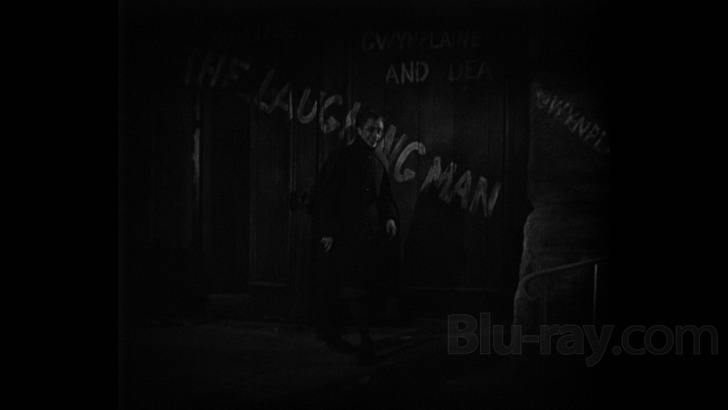
23 page booklet featuring an essay by film historian Kevin Brownlow, an essay by Berklee School of Music alum Sonia Coronado about the production of the new original score, production photographs, cast & crew credits, and notations about the production of this release.
Paul Leni and The Man Who Laughs (HD, 13 min. 42 sec.) is a short featurette which was produced in the style of a visual essay. The essay explores the origins of The Man Who Laughs as a production: examining the key players involvement in the film and the great lengths to which the filmmakers (most especially director Paul Leni) went to creating this silent masterpiece. It's an informative and essential view for anyone who appreciates the high artistry of The Man Who Laughs.
Rare Image Gallery is an impressive collection of high resolution stills of classic images from behind the scenes and other rare promotional materials such as the original poster artwork. These stills are absolutely beautiful. It's insanely hard to believe that these old photographs have been so well preserved and are in such high quality. These aren't some musty old photos of the cast or crew but quality high-resolution scans with great black levels and overall depth. It was great fun to click through these quality photographs and see aspects of the film's developmental process unfold.
The Man Who Laughs Blu-ray Movie, Overall Score and Recommendation 
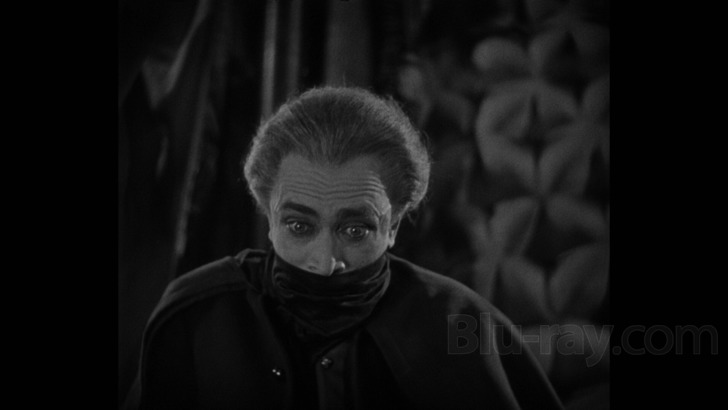
The Man Who Laughs is a brilliant silent film which has withstood the test of time and has proved itself to be a remarkable achievement in the history of cinema. With an incredible performance by the great Conrad Veidt (whose character's maniacal-looking smile inspired the creation of The Joker in the Batman mythology), The Man Who Laughs is a silent classic which should not go overlooked by today's modern audiences. Even after almost 100 years passing by since the original theatrical release premiered in 1928, audiences experiencing The Man Who Laughs today will see a film which is every bit as haunting, compelling, and essential as it was then. A masterpiece.
Similar titles
Similar titles you might also like

The Hunchback of Notre Dame
1923

The Cat and the Canary
Standard Edition | Masters of Cinema
1927

The Seventh Victim 4K
1943

Hasta el Viento Tiene Miedo
Even the Wind Is Afraid
1968

The Red Queen Kills Seven Times
La dama rossa uccide sette volte
1972

Mr. Sardonicus
1961

Eyes Without a Face 4K
Les yeux sans visage
1960

Jug Face
2013

The Queen of Spades
1949

The Neon Demon
2016

Fedora
1978

Reflections in a Golden Eye
Warner Archive Collection
1967

The Black Castle
1952

Night Tide
1961

Dragonwyck
Limited Edition to 3000
1946

King Kong
Warner Archive Collection
1933

The Phantom of the Monastery
El fantasma del convento | Indicator Series | Standard Edition
1934

The Curse of the Crying Woman
La Maldición de la Llorona
1963

The Phantom of the Opera
1925

The Return of Dracula
The Fantastic Disappearing Man / Curse of Dracula
1958
